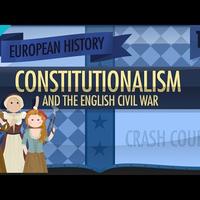English Civil War: Crash Course European History #14 (2)
Thomas Hobbes took a very pessimistic view of human nature and argued for an absolutist
form of political organization in his book Leviathan.
It argued that a lack of political regulation created lives that were “solitary, poor,
nasty, brutish, and short.”
In Hobbes' worldview with absolute rule, one surrendered any claim to personal liberty
but received in exchange a measure of personal well-being and protection from that absolutist
government.
But there was another famous English theorist of government and human society, John Locke,
who presented a rosier view in his Two Treatises of Government.
Locke argued that in a natural world, individuals were born free and equal, but that they rationally
banded together to create a government that would uphold laws and protect their rights.
So Locke is seen as articulating a theory of government similar to the one put forth
by the Glorious Revolution--and also similar to the one outlined in the preamble to the
U.S. Constitution.
And in many ways, Locke's political thought has been seen as the foundation of traditional
or classical liberalism—that is, the belief in rights and freedom as intrinsic to the
human self.
And we see this theory amplified from Locke's time down to the present day.
Like, today, many of us take it for granted that humans have certain natural rights--including
the rights to life, liberty, and property, language taken directly from Two Treatises.
But human rights are an invented concept--albeit a very useful one.
King Henry VIII, for instance did not agree with the notion that those who claim to own
land actually owned it, as evidenced by his extensive reclamation of Catholic land for
himself.
The creation of concepts of human rights reminds us again that how we imagine the world--and
indeed how we imagine ourselves and each other--deeply impacts the world in which we end up living.
Whether we believe in human rights--and how we act on that belief--has profound consequences
today, just as it did in The Glorious Revolution.
Next week we're gonna cross back to the continent to see the Dutch variant on constitutional
government, including all its twists and turns AND CANNIBALISM.
Thanks for watching, Ill see you then.
[1] Quoted in Susan K. Kent, Gender and Power
in Britain, 1640-1990, (New York: Routledge, 1999) 22.

